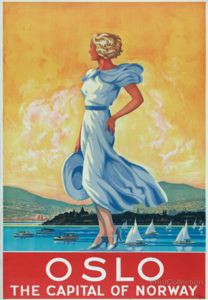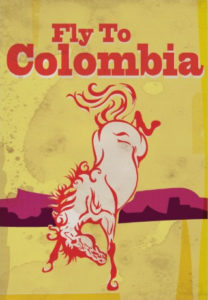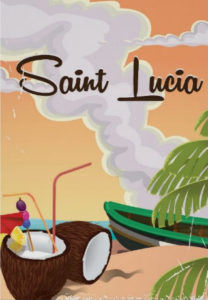A guest post by Anthony Dobranski.
What’s a hybrid genre? You won’t often find hybrid works marketed as such, since there are only so many aisles in the bookstore. Look in — and across — the larger genres’ shelves, however, and they appear more and more. Diana Gabaldon’s Outlander novels rank as Amazon best sellers in historical fiction and time travel romance. Charlene Harris fused mystery and horror fantasy in the Sookie Sackhouse series, and won top mystery awards for it. Tor.com now has a column for hybrids.
A hybrid genre story uses essential elements of two or more genres, in a single story that honors the audience’s expectations for its parent genres, but also questions them — or at least plays rough with them.
My forthcoming novel The Demon in Business Class is a hybrid fantasy, a modern-day story of magic and the supernatural, in the international setting of a corporate thriller, with a romance that changes the story but also completes it.
I wanted to write a fantasy about my own place and time, the way Wilde set The Picture of Dorian Gray in Victorian England. I live in an amazing era, the dawn of the networked age, a far happier adult world than the Cold War nuclear winter feared in my childhood, and a world more open to many kinds of people. It is also a time of cultures clashing violently, of heartlands that feel abandoned by elites, on all sides. Lately we’re hearing from globalization’s discontents, and I don’t discount their grievances or suspicions. I worked in international business, however. I saw its good side, its optimism, the way it helped humanity shift from Cold War us-vs-them absolutism to complex morally-unsatisfying alliances that feed and clothe more than war did.
I had the sudden bold idea for a novel, a difficult romance between supernatural corporate rivals representing moral opposites, a fantasy for a time of change and ferment, both chaotic and intoxicating.
The problem is, that’s a mess of a story, a weird assemblage that invites yet leaves unsatisfied the expectations of three different genre audiences. Here are just a few:
- Magic — the directed use of supernatural power to achieve a goal — changes any society where it is public.
- In fantasy, a heroic and vigorous culture overcomes a decadent if powerful one.
- What would a business with magical powers advocating a moral polar attitude… sell?
- Corporate thrillers require a big corporate conspiracy, whose goal is either money or power.
- Romance is about individuals.
- Romance disallows villains. Anti-heroes, yes, but even they must be morally improved by love.
- If the opposition is truly polarized, each has to find something repugnant in the other — which makes romance hard.
- Romance ends a romance; exposure ends a corporate thriller; in a clash of good vs. evil, evil has to lose.
You’ll have to wait until this fall to see how I got all those narrative questions and more all resolved, but it took witches, playboys, gangsters, cultists, a prophet, two angry angels, and a very modern Tarot deck – along with several rewrites and the help of committed beta-readers!
Along the way, though, I discovered some principles that can help you develop your hybrid genre story:
Know what you want. A story speaks to humanity through genre norms, but if you’re so flagrantly violating the norms of a genre, you’re doing it for a reason. If you don’t know what that is, it’s hard to work it into your story. It doesn’t have to be an easy reason to explain. Mine was so hard to explain that I had to write a novel to do it. It’s what binds all your other ideas together, however, so be clear about it.
All plates keep spinning. A hybrid tale gives your characters multiple arcs, and none stop, though some can slow. Think through where the character needs to go on each arc to see how to weave them together.
Genres themselves are as diverse as insects. Even a seemingly niche category like “sci-fi with aliens” encompasses 2001, Pacific Rim, and Aliens — each of which also belongs to a wholly separate sub-genre (hard-SF, kaiju, and bug hunt) with different ways to show heroism. Even if you want to apply a genre “norm,” there’s more than one way to go about it.
Don’t forget the writing. You are writing one book, but as your genre elements shift, your writing can shift with them. This is a chance to play, to satisfy yourself and your audience with the style to go with your story. Be terser in the thriller elements, festive in the social moments, vulnerable in romance, quick and cutting in anger.
Don’t fight a genre — use it. Genre demands and tropes can enliven your story, if you use them creatively. To have a romance that worked out, I couldn’t make my fated opponents the primary actors for or against a worldwide conspiracy, its James Bonds or its Blofelds — but I could make them a small part of such plans, maybe even a bigger part than they knew, while still giving them believable loyalties and higher stakes.
Consider the genre’s own influences. Noir and cozy mystery differ in setting and tone, but also in the social class and status from which their stories view their societies. Looking past the symbols to their hidden meanings gives you new perspective on how to refit elements to your story. Because —
It’s still all your story. We’ve been talking about genre norms and conventions as if you’ll get issued a citation from the genre department. You won’t. You have incredible creative freedom – if you stick your landings.
Are you writing a hybrid genre story? Talk about it in the comments below!
 Anthony Dobranski is an author from Washington DC. His first novel, The Demon in Business Class, comes out this fall from WordFire Press.
Anthony Dobranski is an author from Washington DC. His first novel, The Demon in Business Class, comes out this fall from WordFire Press.







 Anthony Dobranski is an author from Washington DC. His first novel,
Anthony Dobranski is an author from Washington DC. His first novel,